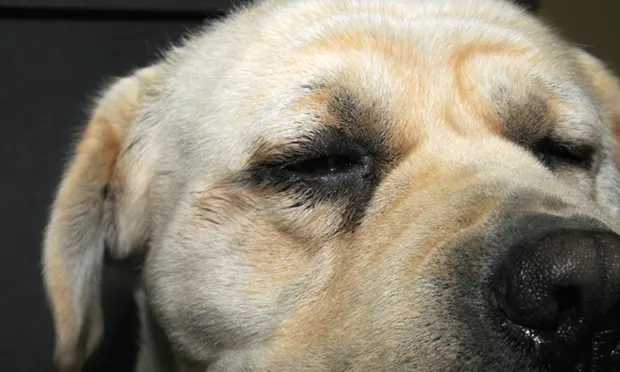Overview of Canine Hypothyroidism
Patty Lathan, VMD, MS, DACVIM (Small Animal), Mississippi State University

Profile
Definition
Hypothyroidism is an endocrinopathy caused by decreased production of thyroid hormone.
Systems
Because most cells in the body are affected by thyroid hormone, hypothyroidism can affect most organs.
Common signs are related to the dermatologic system and decreased metabolic rate.
Related Article: Hypothyroid-Caused Hyperlipidemia
Genetic Implications
Lymphocytic thyroiditis is heritable in beagles and borzois; heritability is suspected in other breeds.
Congenital hypothyroidism is an inherited autosomal recessive trait in rat terriers, toy fox terriers, and giant schnauzers.
Incidence/Prevalence
Approximately 1 in 200 dogs is affected.1,2
Signalment
Breed
Golden retrievers, Doberman pinschers, and spaniels are predisposed.1,2
There may be regional differences.
Multiple breeds are predisposed to lymphocytic thyroiditis and likely predisposed to hypothyroidism,3 but any breed may develop hypothyroidism.
Age & Range
Mean age is 7 years (range, 0.5–15 years).
Hypothyroidism secondary to lymphocytic thyroiditis appears to develop at a younger age than idiopathic thyroid atrophy.
Sex
Spayed and neutered dogs are at increased risk compared with intact dogs.
Causes
Primary hypothyroidism, the most common form, results from destruction of the thyroid glands.
Secondary hypothyroidism, caused by decreased thyroid-stimulating hormone (TSH) release from the pituitary, has rarely been reported.
Tertiary hypothyroidism, caused by hypothalamic dysfunction, has not been proven in dogs.
Congenital hypothyroidism from thyroid peroxidase deficiency has been seen in rat terriers and toy fox terriers. Giant schnauzers also develop congenital hypothyroidism, probably from TSH or thyrotropin-releasing hormone (TRH) deficiency.
Pathophysiology
Adult-onset hypothyroidism is typically caused by lymphocytic thyroiditis or idiopathic thyroid atrophy.
Lymphocytic thyroiditis is characterized by infiltration of the thyroid gland by lymphocytes, plasma cells, and macrophages.
Eventually, fibrous connective tissue replaces parenchyma.
Idiopathic thyroid atrophy is characterized by thyroid parenchyma being replaced by adipose tissue.
Fibrosis and inflammation are minimal.
Idiopathic thyroid atrophy may be the result of thyroiditis.
Thyroid carcinoma is a rare cause of hypothyroidism, which does not develop until at least 75% of the thyroid has been destroyed.
Signs
Common metabolic signs include weight gain, lethargy, and weakness; cold intolerance or heat-seeking behavior; and mental dullness.
Dermatologic changes are common (see Dermatologic Signs).
Neurologic dysfunction is uncommon and resolves with levothyroxine supplementation.
Peripheral neuropathy may result in exercise intolerance, ataxia, weakness, conscious proprioception deficits, and hyporeflexia.
Recent studies suggest that abnormalities in the limbs are more related to muscle than nerve.4
Cranial nerve dysfunction (V, VII, VIII) and peripheral and central vestibular disease have been reported.
Seizures are rare.
Cardiac abnormalities (eg, weak apex beat, bradycardia) are uncommon.
Reproductive abnormalities include periparturient mortality and lower birth weight in pups born to hypothyroid bitches,5 and inappropriate galactorrhea in females.6 Decreased fertility is not well documented in hypothyroid bitches. Decreased libido and fertility have been reported in males of other species; however, decreased fertility was not documented in a study of 131I induced hypothyroidism in male dogs.7
Ocular changes may include corneal lipid deposits, lipemia retinalis, uveitis, secondary glaucoma, and keratoconjunctivitis sicca.
Laryngeal paralysis and megaesophagus have been reported, but no causal relationship has been proven.
Myxedema coma is very rare.
Diagnosis
Differentials
Dermatologic abnormalities could be caused by hyperadrenocorticism and alopecia X.
Metabolic signs could be caused by many other disease processes.
Laboratory Findings
CBC, serum biochemistry profile, and urinalysis are indicated to rule out other diseases before thyroid-specific tests are conducted.
Mild nonregenerative anemia is common.
Most hypothyroid dogs have fasting hypercholesterolemia and hypertriglyceridemia.
Alkaline phosphatase (ALP) and alanine aminotransferase (ALT) may be slightly elevated.
ACTH = adrenocorticotropic hormone, ATAs = antithyroglobulin antibodies, fT4 = free thyroxine, TRH = thyroid-releasing hormone, TSH = thyroid-stimulating hormone, T3 = triiodothyronine, T4 = thyroxine, TT4 = total thyroxine

A 2-year-old neutered Labrador retriever with classic signs of myxedema (cutaneous mucinosis) and failure to regrow fur clipped several months before presentation for severe lethargy, heat-seeking behavior, and reluctancy to rise.
Thyroid-Specific Diagnostics
Total T4 (TT4) concentration is a sensitive but nonspecific screening test; values are low in most patients.
Additional testing (free T4 [fT4 ], TSH) is recommended before diagnosing hypothyroidism.
Euthyroid dogs may have low TT4 levels because of individual variation, nonthyroid illness, or drug administration.
Euthyroid sight hounds and sled dogs often have levels below the reference range, leading to inaccurate diagnosis.
Measurement of fT4 by equilibrium dialysis is a more accurate indicator of thyroid function than TT4, as fT4 (not bound to proteins) is the active form.
It is also less affected by nonthyroid illness when compared with TT4.
Measurement of fT4 without an equilibrium dialysis step offers no diagnostic benefit over TT4.
Because of decreased negative feedback, TSH concentrations are often elevated in hypothyroid dogs.
Increased TSH in conjunction with decreased TT4 or fT4 is specific for hypothyroidism; however, up to 33% of hypothyroid dogs have normal TSH concentrations.
Measurement of T3 concentrations is less accurate than measurements of TT4 and fT4.
The TSH stimulation test evaluates thyroid reserve.
Lack of increase in T4 concentration 4–6 hours after TSH administration is standard for diagnosis of hypothyroidism, but the expense of human recombinant TSH limits the test’s clinical usefulness.
The TRH stimulation test is less straightforward, less reliable, and more difficult to obtain than the TSH stimulation test.
Of dogs with hypothyroidism, antithyroglobulin antibodies (ATAs) are found in ~35%, anti-T3 antibodies in 34%, and anti-T4 antibodies in 15%.
Antibody presence is not diagnostic of hypothyroidism; <20% of euthyroid dogs with ATAs develop hypothyroidism signs within 1 year.
In patients with consistent signs, CBC results, and serum biochemistry findings, begin by measuring TT4 concentration. If value is low, fT4 and TSH concentrations are measured. A low fT4 concentration with an increased TSH concentration is approximately 86% accurate for diagnosis.
As some hypothyroid patients will have TSH concentrations within reference range, therapeutic trial is recommended in patients with low fT4 and strong clinical suspicion.
While owners may avoid additional diagnostics beyond decreased TT4 concentration, treatment without appropriate diagnostics should be avoided. Cost of treatment is expensive over time, and inappropriate diagnosis may lead to delayed diagnosis of another disease.8

Severely thickened skin, particularly in the eyelids and forehead.
Drug Interference with Thyroid Testing
Several medications can affect thyroid hormone concentrations9; these drugs (except sulfonamides) rarely cause clinical hypothyroidism but can interfere with test results.
Glucocorticoids decrease TT4, fT4, and sometimes TSH in a dose-dependent manner.
Such testing should be avoided when steroids are administered.
Phenobarbital can cause decreased TT4 and fT4 and slightly increased TSH but does not cause clinical hypothyroidism.
Sulfonamides block T3 and T4 synthesis and long-term administration can cause clinical hypothyroidism with increased TSH.
Reversed by discontinuation.
Potassium bromide does not appear to affect thyroid function.
Aspirin decreases TT4 and fT4 concentrations.
Carprofen, meloxicam, and deracoxib do not appear to significantly affect thyroid function.
Hyperpigmentation on the abdomen. Metabolic signs improved significantly within the first week of therapy, but the dermatologic signs took several months to resolve.

Imaging
Ultrasonography demonstrates decreased echogenicity and smaller-than-average (volume and cross-sectional area) thyroid lobes in hypothyroid versus euthyroid dogs.
Treatment
Inpatient or Outpatient
Almost all hypothyroid dogs are outpatients. Patients with myxedema coma (rare) are treated with IV levothyroxine and supportive therapy.
Medications
Oral levothyroxine supplementation is initiated at 0.02 mg/kg q12h. Dose may be based on surface area for larger dogs (0.5 mg/m2).
Patients that respond to therapy and have appropriate TT4 concentrations can be switched to q24h therapy but may require q12h dose if response is not maintained.
Administration with food decreases bioavailability.
Brand name or FDA-approved generic products are recommended, as bioavailability varies among products.
The patient should be maintained on the same product, or dose adjustment may be needed.
The oral liquid formulation of levothyroxine (Leventa) has higher bioavailability than the pill formulations and can be administered q24h.
Precautions
Because thyroxine increases cardiac oxygen demand, initial dose should be decreased by 25%–50% in patients with cardiomyopathy.10
Treatment of hypothyroidism may precipitate an Addisonian crisis in patients with undiagnosed hypoadrenocorticism.
Before initiating levothyroxine therapy, hypoadrenocorticism should be ruled out with a baseline cortisol and/or ACTH stimulation test in patients with consistent signs or bloodwork (especially electrolyte) abnormalities.
Follow-up
Patient Monitoring
Concentrations of TT4 should be assessed 4 weeks (sooner in patients with clinical signs of hyperthyroidism) after initiation of levothyroxine therapy or dose adjustment.
Adjustments should be made based on both TT4 concentrations and clinical response to therapy.
Once an appropriate treatment is established, TT4 concentrations should be measured q6mo.
Trough (premedication) TT4 concentrations should be in the middle of the reference range, and peak (4–6 hours after medication) concentrations should be in or just above the reference range.
Peak concentration is often measured alone in patients on q12h dosing.
Both values are needed in patients on a q24h regimen.
Appropriate peak concentration in conjunction with low trough concentration suggests need for q12h dosing.
Another goal of therapy is normalization of TSH concentration if it is increased at time of diagnosis.
Clients may note an increase in the dog’s energy level in 1–2 weeks of instituting therapy, but weight loss and dermatologic changes are not usually obvious for at least a month, and hair regrowth can take several months.
Neurologic changes may initially improve rapidly initially, but full resolution can take several months.
Complications
Lack of therapeutic response is common with an incorrect diagnosis based on only a low TT4 value.
Other possibilities include decreased GI absorption, poor compliance, and concurrent unidentified skin problems (eg, flea hypersensitivity, atopy).
In General
Relative Cost
CBC, serum biochemistry profile, urinalysis, TT4, fT4, and TSH: $$–$$$
Monitoring and medication: $$/year
Prognosis
Excellent with a good quality of life.
Related Articles
Editor's note: This article was initially published in November 2012 as "Diagnose & Treat Canine Hypothyroidism"